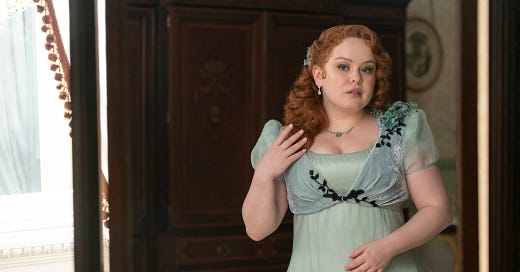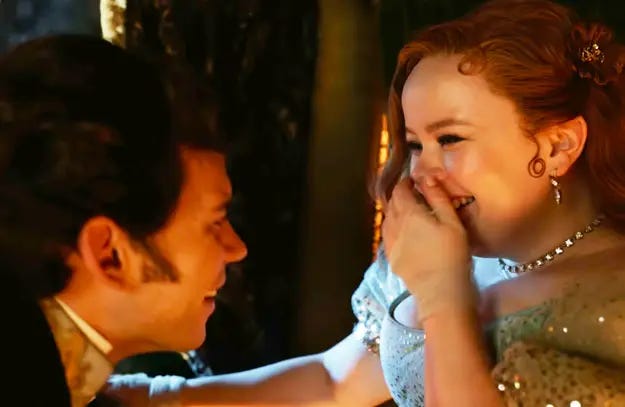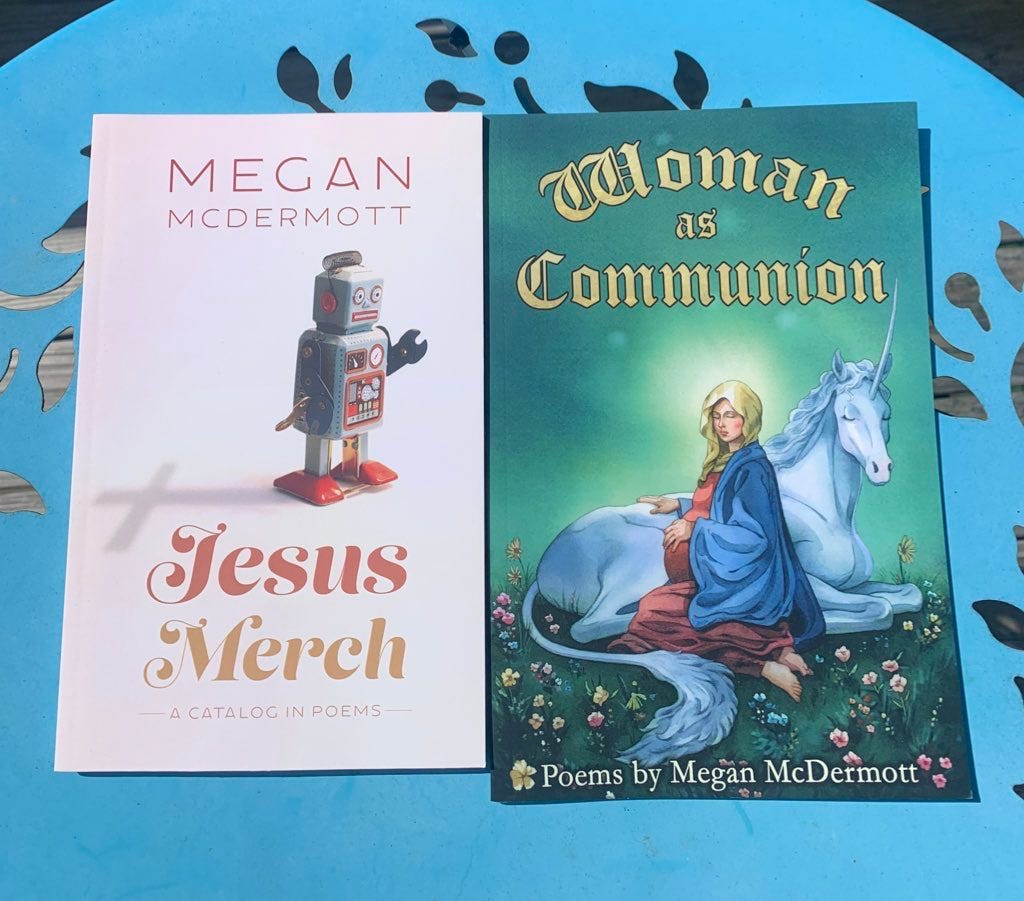Penelope Featherington and the Weaponization of Women's Loneliness
And also misogynistic football players...and poetry news!
Like much of the population, I am a devoted viewer of Bridgerton, embracing each season for its particular flavor of romantic trope: two people fake dating (well, fake courting) who actually fall in love, enemies to lovers, and, in the case of Bridgerton season 3, friends to lovers. If you’re not a viewer, we’re in a limbo currently, waiting for the second half of season 3 to be released on Netflix. This gives those of us who watch plenty of time to dissect the first 4 episodes!
The main love story of this particular season is between Penelope Featherington (who we have been following for much of the show, though not in the capacity of a romantic lead) and Colin Bridgerton. Penelope is entering into her third season onthe marriage market and has yet to find a husband. Ready to be out of her mother’s home and reluctant for any of her future prospects to be wrapped up with her married sisters, she is determined to find a husband.
If you don’t want any spoilers, this is the time to bookmark this post and come back to it after you’ve watched!
OK to go ahead?
There comes a point in episode 2 where Penelope is sure she’s ruined her chances at marriage. Her friend (and longtime crush) Colin Bridgerton has been secretly giving her lessons on how to attract a husband. When word of this gets out at a ball, Penelope is humiliated. Later that night, Colin checks up on Penelope at her home. In a moment of extreme vulnerability, Penelope asks Colin for a kiss, saying “I am nearly on the shelf and have never been kissed and I’m not certain I will ever be….I do not wish to die without ever having been kissed.”
I’ve become fascinated by some of the negative reactions to this scene that I’ve read online. One Facebook post complained, with Penelope being so “young, still very girlish” (as opposed to the book the show is based on, where this storyline takes place in Penelope’s late twenties), “she didn’t really have any reason to think she would die un-kissed.” I immediately became baffled that anyone would react to that scene with bafflement! The show makes it very clear that a lady in that society is expected to have no intimate physical contact outside of marriage, so if a woman thinks nobody will marry her, of course the prospect of dying without ever being kissed might come up. Even without that context, though, I wouldn’t be surprised to hear the same sentiment from someone’s lips in our much more flexible present-day culture!
I was once a teenage girl who sometimes felt that fear – what if I die without ever being kissed??? A teenage girl who felt “on the shelf” though my life had barely begun! And I would venture a guess that many a teenager, even many a twenty-something and beyond, have felt that fear, or similar ones, about their future if their romantic experiences weren’t unfolding on the timeline they thought of as normal or desirable. I may not suggest Penelope’s tactic as a prime pick-up line today, but I really loved that we got to see Penelope articulate what is, for many, a very real fear that feels embarrassing to name.
Others were dissatisfied not because Penelope felt these things, but because she articulated them to a man, the idea being that to share insecurity and request intimacy in this way is weak or desperate. Our society is uncomfortable with seeing women express loneliness or insecurity from many different angles. (Don’t get me started on the opinion that women don’t actually experience rejection and if any woman is lonely it’s simply because she’s hopelessly choosy….) This particular angle — concern that Penelope, or any woman, will come across as desperate — can sometimes come from a place of wanting to empower women — wanting to emphasize that women don’t need men or that we should never allow a man, or men’s desire (or lack of desire) for us, to put us in a vulnerable or embarrassing situation.
However we might wish it otherwise, though, being human IS vulnerable and embarrassing. You can be a strong, vibrant, talented, intelligent, beautiful, insert-all-the-positive-adjectives-here woman (Penelope has her flaws but she’s also many impressive things — spoilers for those who have never watched, but she covertly runs a Regency Era gossip empire and is bringing in some big bucks!) AND feel insecure. You can be all those things AND want intimacy, touch, and affirmation. You can be all the good, powerful, beautiful things AND be worried about ending up alone. Of course not every woman desires what Penelope desires, but it is not a contradiction to strength, complexity, intelligence, or feminist ideals to have the desires Penelope and so many others have.
There’s a lot in our world that might compel us to keep all those desires, insecurities, and fears inside. Beyond not wanting to be tainted with the label of “desperate,” we might be worried about having our emotions rhetorically weaponized by those who proclaim a single story of womanhood and are often working to take away women’s rights. Single and/or childless women, especially above a certain age, are a talking point in conservative spaces, where any dissatisfaction single women might express could be used as evidence to point to the flaws of feminism or the “lie” that value can be found in experiences outside of marriage or motherhood.
Much of this dialogue has flared up recently in the wake of NFL player Harrison Butker’s commencement speech. I don’t want to dive too much into his points (frankly because they don’t deserve it), but a part that has been getting much attention is when he says “women…have had the most diabolical lies told to you.” He doesn’t articulate these “lies” clearly, but his transition from this sentiment into extolling the value of being a homemaker and saying his wife’s life “truly started when she began living her vocation as a wife and a mother” makes pretty clear that the “lies” have something to do with women finding fulfillment outside of those identities. Calling, discernment, and vocation are rich subjects for spiritual reflection and exploration, but for people like Butker, those things barely matter; instead of discovering God’s purposes for our individual lives or collaborating with God in creating that purpose, there are instead God-given gender roles meant to show us the way or at least give us guard rails to finding that way, perhaps with a few occasional exceptions (for priests and nuns).
Sometimes it can feel like expressing any loneliness as a woman — especially as a single woman in her thirties — is giving ammunition to that viewpoint, giving misogynists proof that, see, women actually can’t be happy if they prioritize their careers, themselves, or any way of life we deem un-traditional, proof that a feminist can never find a happy romantic relationship. Any complex feelings someone like me might have about her life or choices becomes commentary on the validity of feminism (as if feminism was just one clearcut thing), despite the fact that plenty of women who do identify with feminism are married, mothers, etc.
I feel complicated, vulnerable things about my life not because feminism has done me wrong or because I haven’t bought into the safety and security of gender roles, but because I am a human being, and life is complicated and vulnerable for all of us. Single people aren’t the only ones who feel lonely or question aspects of their lives or choices. To use the particular complications and vulnerabilities of singleness as a justification for reductive misogynistic gender roles is a popular tactic, but it’s based on a flawed assumption: that women should be willing to exchange any experience of loneliness for substandard relationships where they aren’t seen in their full humanity and for a society that fails to honor their individuality and freedom. If my choices were between being single forever and the strict binary roles lauded by Butker and friends (which, again, those are not the choices! there are many feminist women I know in fulfilling relationships, some with men, some not!), the choice would be clear.
This potential for rhetorical weaponization is perhaps why I feel so strongly about Penelope Featherington expressing her loneliness out loud. Although it sometimes feels dangerous, let’s declare that vulnerability and strength can co-exist. It is not desperate to fear being alone or express our fears. It is not desperate to want intimacy or to want things in your life that you may not currently have. Want and fear are real, human. Vulnerability is not a failure. It is one part of a vast, beautiful, interior landscape.
Some of you know that I’ve been working on a new full-length poetry collection that I hope to begin submitting shortly. Much of this book depicts the vulnerability and complexity of entering into your thirties single when marriage and parenthood are things you’ve imagined for your life. As I’ve been working on the book, I’ve occasionally thought about how it could be manipulated to promote a misogynistic narrative – how it could be weaponized. But just because something can be used against us, it doesn’t mean we should stop ourselves from expressing it. We should never concede our self-expression to those who are only capable of perceiving it through their own reductive lenses. Misogyny seeks to repress the full selves of women, so perhaps we might even call is a feminist act to let the full self be on display even when that self is lonely, or fearful, or insecure, even when that self may be wondering about her choices or a life not led.
At the very least….so far this season, this kind of act seems to have worked for Penelope Featherington!
Poetry News
*I finally have more info on my poetry reading in Providence coming up on July 9th, 2 p.m., at Church of the Redeemer in Providence, Rhode Island. Here’s the flyer. If you’re in the Providence area, I’d love to see you, and/or if you know anyone in the Providence area, please feel free to share this info with them.
*I recently restocked on copies of my chapbook published through Game Over Books, Woman as Communion! If you’d like buy a copy directly from me, I’m selling them for $15. There’s also a discount if you want both Woman as Communion and Jesus Merch - $30 for both shipping included! Please be in touch with me here, on social media, or by email at contact@meganmcdermottpoet.com.
As always, you can buy my books elsewhere too. Jesus Merch is available for purchase directly from my publisher Fernwood Press or through any major book retailer, including Bookshop.org, Amazon, Barnes & Noble, etc. Your local bookstore or library should also be able to order it! Woman as Communion is also available from Game Over Books or Amazon.
If you’ve read and enjoyed either, please consider reviewing at Amazon, Goodreads, Storygraph, etc., or sharing your thoughts on your social media of choice. It means a lot!
Until next time,
Megan








I just watched the first half of season 3 this weekend… I loved that Penelope asked for what she wanted. I got the message growing up that men (in hetero relationships) are the pursuers, meaning women weren’t often portrayed owning their own needs and desires.
Thanks for this essay! More to think about when the next episodes are released!